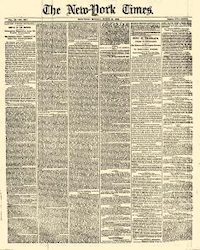The New York Times, June 26, 1860
The Presidential canvass has at last fairly opened. The several political parties have taken their ground, all the candidates are in the field, and it is not difficult to foresee the result. The Republican ticket is morally certain to be elected. Strong in the public sentiment of the Free States, the Republican Party derives an immense advantage from the disruption and utter demoralization of its opponents.
The heat of the battle, it is easy to see, is to be in the Southern States. The question of protecting Slavery by act of Congress—of using the power of the Federal Government for its extension—is to be contested and decided on Southern ground. For the first time in our political history, the slaveholding States will be divided. Hitherto the contest has been mainly sectional: the North has taken one side and the South the other. Now, the South finds the “irrepressible conflict” in the bosom of its own society. DOUGLAS will actually represent in the South that hostility to Slavery extension which is already the unanimous sentiment of the North. He will contest upon slave soil the power of the Federal Government to extend Slavery: and while his position on this question is, in our judgment, unsound and untenable, it is probably the only ground upon which any contest whatever could be maintained in the Southern States. He concedes that slaves are property, recognized as such by the Federal Constitution:—but claims that in the Territories it must be dependent entirely, for protection and existence, upon the local law. Few, if any, of the Southern States will endorse his views;—but if he were more nearly right, they would not tolerate him an hour.
In the Northern States Mr. DOUGLAS is strong partly on account of his political position and partly from his personal qualities. He represents more thoroughly than any other public man that quickness of intellect, vigor of will and pushing restlessness of temper which characterize American life. Without any large, general culture, he has the useful faculty of studying a particular subject rapidly, and of mastering its leading facts and principles. Whatever he knows is always at his command. He has indomitable industry, an insolent courage, and a tenacity of purpose, born partly of conviction and partly of self-will, which nothing can defeat. These are qualities which in our society, or indeed in any other, give a politician a strong hold upon the popular admiration; and Mr. DOUGLAS adds to them just enough of that irresponsible, good-natured recklessness which characterizes the indigenous American rowdy, to make him the decided idol of a very large and influential class of our political society.
But aside from these personal characteristics, Mr. DOUGLAS is the champion of Popular Sovereignty;—and whether that doctrine finds any warrant in the Constitution, in legal precedents, in the opinions of the Fathers, or not, it has a very strong hold upon the popular instinct. The great mass of the people in all sections, whatever may be their opinions upon its legal validity, recognize it as a fair, just and safe way of solving a very difficult problem. Let the people of every territory decide for themselves whether they will have Slavery among them or not;—let Congress and the Federal Government abandon all attempts, either to force it upon them, or to prohibit them from admitting it;—this, if not the highest Constitutional ground, is ground which satisfies the instinct of nine-tenths of the American people. If it were generally felt that the adoption of this policy depended upon the election of Mr.DOUGLAS, he would be a very formidable candidate. But it is not. The truth is, the Slavery question will be settled on this basis, whatever party may come into power. This is, under any circumstances, to be the practical solution of the difficulty. The Republican party has asserted, though in a modified form, the abstract power of Congress over Slavery in the Territories: but it is not commited to its exercise, nor is there one chance in twenty that any occasion will arise where its exercise would be of service to the cause of freedom.
Mr. DOUGLAS will not have, therefore, in the North, all the support which this principle, distinctly and nakedly presented, would give him. Thousands and tens of thousands, who believe in the practical wisdom of Popular sovereignty, will vote the Republican ticket,—because they recognize in that party the only compact, responsible and effective political organization of the day. It is the only party in a position to achieve success, or to use it wisely when it has been won. It represents and embodies to-day, far more thoroughly than any other, the democratic conservatism of the country. It stands midway between the Pro-Slavery-ism which has ruled the Federal Government so long, and the Anti-Slavery-ism which would overthrow it altogether. It holds the Constitutional ground and doctrine on the subject of Slavery, and respects, thoroughly and rigidly, the limitations which the Constitution imposes upon its action. It holds the absolute majority of nearly all the Northern States already; while in those which are doubtful it will be substantially aided by the nomination of BRECKINRIDGE. In Illinois and Indiana Mr. BRECKINRIDGE has a positive strength which will give him twenty or thirty thousand votes in each; in Pennsylvania the power of the Administration is sufficient to give him quite as many, and in New-York we believe it safe to predict that he will withdraw fifty thousand votes from the support of DOUGLAS.
The action of the Democracy at Baltimore seems, with reasonable diligence on the part of the Republicans, to have insured the success of the Republican ticket.
